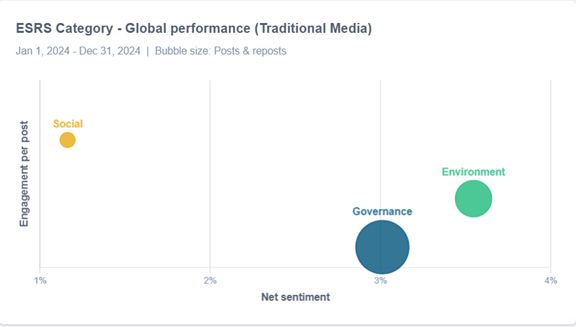The Silent Backlash: How Greenwashing Evolved and why your Reputation Might be Next
The Evolution of Greenwashing
The term greenwashing was coined in 1984. Since then, it has expanded beyond false recycling labels to include misleading claims about carbon neutrality, biodiversity, or social impact. From 2021 to 2024, greenwashing mentions surged globally, especially during ESG-related events such as COP27 and COP28. Today, companies are being called out not only for their climate pledges but for any ESG claim that lacks substance. The bar has risen, and the tolerance for vague communication has dropped.


NBS factory _ impressions “greenwashing” 2021 –2024
The term greenwashing is used in every language and in a huge number of countries. It has established itself throughout the world, regardless of culture, which is the first step towards a common understanding of the same concept. Together, speaking the same language, we're already stronger.
Note: We have excluded China and Russia since consistent data was not available for the period of our research.
Full year 2021:
Europe leads the discussion, followed by the East and the West coast of the US.

Full year 2024:
We see Europe immersed in discussions, followed by the US and some parts of Australia

THIS SHOWS THE TREND OF GREENWASHING DISCUSSIONS WITH REAL COMMUNICATION PEAKS IN THE EU
We see many common peaks in France and EU. However, interestingly we see 2 other peaks, one in February 2022 about EU’s proposal to declare nuclear energy as sustainable and another one in August 2023 following Greta Thunberg’s decision to pull out of Edinburgh Book Festival owing to greenwashing as one of the sponsors for the festival, the Baillie Gifford investment firm invests heavily in fossil fuels. There were also significant discussions on greenwashing practices by Azerbaijan, the host nation of COP 29.

Sector analysis: who’s under fire?
Energy and utilities remain the most criticized sector when it comes to greenwashing, followed closely by finance. According to NBS factory Insight page data, these two industries dominate the conversation, especially when claims involve 'net zero' or ESG-labeled investments.
Other sectors like fashion, food, and automotive also face high scrutiny, particularly when their marketing outpaces their measurable impact. Interestingly, industries with high ESG communication volume—such as renewables—can also face backlash when expectations are unmet.


We see that Energy & Utilities and Finance remain the top 2 sectors with mentions of greenwashing. Interestingly, Energy & Utilities has seen a growth from 28% to 39% and Finance from 23% to 28%.
The top 5 sectors remain unchanged from 2021 to 2024.
Advertising & Marketing has emerged as a new category and continues to grow. Sports, Health and Face& Body Care/FMCG are no longer the top sectors associated with greenwashing.
Governance as the new risk frontier
Greenwashing isn’t just about the environment. It’s increasingly about governance. Stakeholders are paying attention to who signs off on ESG promises and whether the company can back up its story with data and transparency.
Sentiment analysis from NBS factory Insight page shows that governance failures now trigger more negative reactions than environmental or social controversies. Reputation is no longer about what you say, it’s about how you manage accountability.


Full Year 2021

Full Year 2024


Governance and Environment are perceived more positively on Traditional Media now compared to 2021.
Governance represents a major reputational risk due to its significant negative engagement on social media platforms. Specifically, the key reasons why governance becomes a focal point for negative sentiment and reputational damage include:
- Corporate Misconduct: Governance issues often involve business conduct, including leadership decisions, ethics, and corporate responsibility. When companies are involved in greenwashing, it directly questions their governance structures and their commitment to transparency and ethical standards. This generates a lot of negative sentiment on social media.
- High Negative Sentiment: Among ESG (Environmental, Social, Governance) categories, governance generates the highest level of negative engagement on social media. Users express strong disapproval when companies' actions contradict their public commitments, especially if there is evidence of misleading environmental claims or unethical practices. This is amplified through viral posts and public discussions.
- Leadership Accountability: Failures in governance, particularly in leadership and decision-making, heighten the risk of reputational damage. When governance is questioned in greenwashing incidents, it signals that company leaders are either unaware of, or complicit in, misleading environmental or sustainability claims. This increases public distrust and leads to a significant backlash.
- Consumer and Regulatory Scrutiny: Governance issues, especially around greenwashing, attract increased attention from both consumers and regulatory bodies. Companies that are seen as manipulating ESG narratives or failing to meet promised standards face heightened regulatory risks, including legal penalties and fines (such as France's law imposing fines for unjustified "Net Zero" claims).
Gender, generations and platforms
Women and young people are the most powerful amplifiers of ESG backlash. While men create more original posts (especially in energy or tech), women are more likely to share, comment and increase visibility, particularly in sectors like fashion, finance and retail.

Men express themselves more and post more on the networks.
It's worth noting that even though the 18-24 and 25-34 age groups are the most active, this doesn't mean that > 35-year olds are mute online, quite the contrary!

When it comes to sharing and exchanging, women are more active than when it comes to posting or writing articles. 18-24 is the most active age group, which shows that young women are being more vocal.
While the stereotype persists that women are more talkative, our observations reveal that men often engage in more conversational exchanges. In contrast, women tend to be more action-oriented and focused on sharing information or resources, rather than simply chatting for its own sake.
Top Voices (Female):

Emma Watson, a renowned actress and activist, led the engagement among top authors. She was followed by content creators Megan McSherry, an eco-fashion advocate, and Venetia La Manna, a sustainable fashion campaigner.
On social media, platform matters. NBS factory Insight page confirms that platforms like X and Reddit generate the most negative engagement. LinkedIn remains relatively balanced but is shifting. Traditional online media is no longer where risk starts, social media is.
For 2021:


We see that Reddit and X are the most negative social media indeed, in line with our conclusion but the most positive social media is in fact, Instagram. Linkedin remains relatively balanced.
Full Year 2024:


Reddit and X remain the most negative social media while we see Linkedin shifting to a more positive space. Instagram remains the most positive.
The Many Faces of ESG-washing
Greenwashing has inspired a wave of similar credibility shortcuts. Here are the most common:
- Greenwashing: Exaggerated environmental claims.
- Bluewashing: Misleading ocean-related pledges.
- Purplewashing: Using gender equality messaging without real inclusion.
- Social washing: Promoting diversity with no internal change.
- Governance washing: Touting leadership ethics without evidence.
- AI-washing: Using buzzwords like 'AI for sustainability' without proof.
- Purpose-washing: Declaring bold missions disconnected from actions.
- Impact-washing: Inflating ESG metrics or green fund credentials.
- Greenhushing: Deliberately downplaying or remaining silent about environmental actions, even when they are genuine
Strategic Recommendations
To manage ESG risk, companies must go beyond communication. They must:
- Audit their ESG claims and stakeholder expectations.
- Train leadership and teams to avoid greenwashing.
- Align communication with measurable governance indicators.
- Monitor cross-platform sentiment weekly.
- Disclose limits and trade-offs transparently.
Conclusion
We live in a moment of radical transparency. Greenwashing is no longer a PR issue—it’s a governance issue, a legal risk and a credibility crisis. Whether your business is in energy, finance or fashion, what matters is no longer what you promise but what others repeat.
- Greenwashing is a single word, common to EVERY language. It's an opportunity to detect weak signals on a global scale.
2. In 2 years, the number of posts mentioning greenwashing has almost quadrupled. However, we see a slight decline in discussions after COP 28 that can be attributed to event fatigue, lesser instances of greenwashing coming to the forefront or a shift in people’s attention towards other global crises or topics. We however see rising discussions again 2024, particularly with peaks surrounding the Anti-Greenwashing Directive and the COP 29 conference.
3. Europe (UK, France, Germany) is clearly the most committed to the subject, followed by the North America (US followed by Canada), Asia (Thailand, India, Singapore) and Oceania (Australia and New Zealand)
4. Energy companies and banks are the first to be challenged. However, the risk for consumer brands is growing rapidly, particularly in the food, textile and automotive sectors.
5. Governance stands out as a critical area for improvement and presents a significant opportunity for businesses to enhance their reputation. It currently generates the most negative sentiment, followed closely by environmental concerns. Within the governance framework, business conduct is particularly crucial and should be a key area of focus for organizations aiming to build trust and accountability. Leadership of these companies should be aware of this. They should have access to detailed analysis for their sector and companies and also get properly trained to avoid reputational risks. Governance-related discussions target sectors such as banking, the oil industry (e.g., Equinor), fast fashion, and the cattle industry, where business conduct is under scrutiny.
6. In traditional media, conversations around social and environmental topics tend to be more positive, which contrasts sharply with discussions on social media. On social platforms, topics such as influencers addressing greenwashing, cultural appropriation related to Azerbaijan’s ethnic cleansing, and AI-washing by companies like Amazon generate much more critical dialogue.
Most posts on social media concerning environmental and governance (E&G) issues are predominantly negative and drive higher engagement. This stands in contrast to traditional media, where discussions around environmental, social, and governance (ESG) topics are typically more favorable.
8. Sources and contact
- NBS factory Insight page (2021–2025 Q1 data)
- European Commission (2021) green claims investigation
- DataReportal Global Digital Overview 2024
- Social sentiment analytics from X, LinkedIn, TikTok
- COP27 and COP28 media coverage
- RepRisk ESG incident data 2023–2024
Contact:
Anne Dumesges
Founder & CEO – NBS factory
Email: anne.dumesges@nbs-factory.com
Phone: +33 6 64 05 38 13
Website: www.nbs-factory.com










